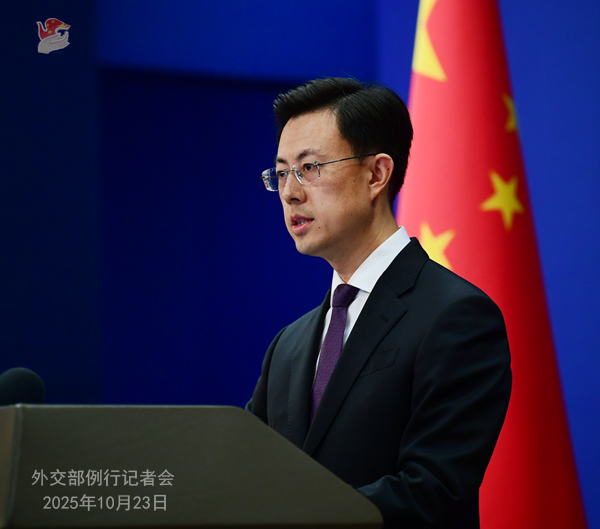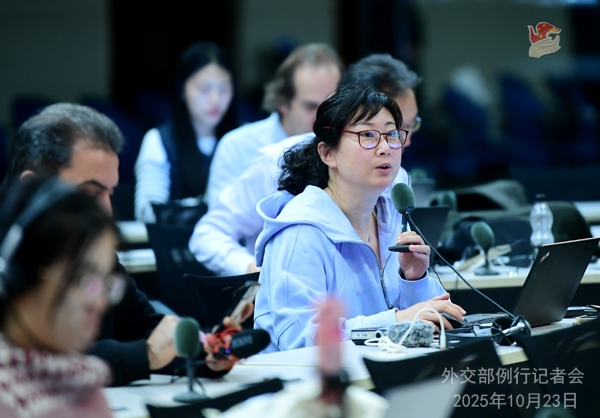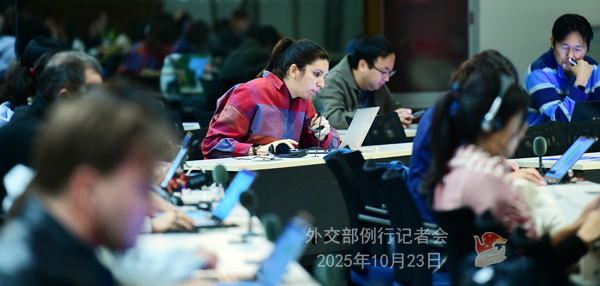
People’s Daily: Tomorrow (October 24) is the United Nations Day. It also marks the 80th anniversary of the entry into force of the UN Charter. In this volatile world, the majority of countries call for continuing to defend the UN’s status and strengthen its role. But some in the world question the effectiveness of the UN, international law and multilateralism, and even say that the UN has failed. What is your comment?
Guo Jiakun: The United Nations is the world’s most universal, representative and authoritative intergovernmental organization. Over the past 80 years, the UN has played an irreplaceable role in safeguarding peace, promoting development and improving the wellbeing of people worldwide. Countries, regardless of their size and strength, are equal members of the UN who enjoy equal opportunities to voice their opinions, fair participation in negotiations on international rules and common access to the outcomes of sustainable development.
The purposes and principles of the UN Charter constitute the basis of international law and are the norms and standards in practicing international rule of law. Nothing can be accomplished without following norms and standards. It is the selective application of the UN Charter by individual countries that resulted in the disorder in today’s world. In a world without the UN, the law of the jungle will prevail, where the strong prey on the weak. It will be like a crossroads without traffic lights where reckless driving and frequent accidents become the order of the day.
Facing an endless array of global challenges and worsening deficits in peace, development, security and governance, the development of the UN has come to a historical crossroads. It is in this context that China, a responsible major country, put forward the Global Development Initiative, the Global Security Initiative, the Global Civilization Initiative and the Global Governance Initiative to better uphold and practice true multilateralism and promote the building of a more just and equitable global governance system. The four initiatives are fully aligned with the purposes and principles of the UN Charter and form an integral whole to help achieve prosperity through development, ensure stability through better security, enhance mutual trust through exchanges between civilizations and pursue justice through sound governance.
No matter how the international landscape will evolve, China will firmly uphold the international system with the UN at its core, the international order based on international law, and the basic norms governing international relations based on the purposes and principles of the UN Charter. We will work with other countries to advance an equal and orderly multi-polar world and a universally beneficial and inclusive economic globalization, and strive towards building a community with a shared future for humanity.
AFP: U.S. President Donald Trump said yesterday that Chinese leader could have a big influence on Russia’s Vladimir Putin over efforts to end the war in Ukraine. Does the Foreign Ministry have a comment on this?
Guo Jiakun: Dialogue and negotiation is the only viable way out of the Ukraine crisis. Coercion and pressuring provide no solution.
Prensa Latina: Cuba has denounced that the United States is bullying countries to drop their support for the UN resolution against the blockade. In addition, the U.S. is pushing other nations to stop sending resources for Cuba’s electrical system. What is China’s position on these U.S. tactics?
Guo Jiakun: We noted relevant report. The U.S.’s blockade against Cuba over the past six decades and more inflicted great suffering on the Cuban people. Instead of reflecting upon what it has done, the U.S. has now doubled down on coercive diplomacy. This seriously violates the international law and the basic norms governing international relations as well as humanitarian principles. The move puts the U.S. on the opposite side of justice and will without a doubt be rejected by the international community.
China firmly opposes the U.S.’s blockade and sanctions against Cuba. At the UN General Assembly, China has voted for Cuba’s resolution calling for an end to the embargo imposed by the U.S. for 32 consecutive times since 1992. The resolution is supported by nearly 190 countries, which points unmistakably to the overwhelming global sentiment on this very issue. China will continue to firmly support the Cuban people in following the development path befitting their own national conditions, safeguarding sovereignty and dignity, and opposing external interference and blockade. We call on the U.S. to lift its sweeping blockade against Cuba at an early date, remove Cuba from the so-called “list of state sponsors of terrorism,” and act in ways conducive to the improvement of Cuba-U.S. relations, and to peace and stability in the region.
CNR: On October 22, the International Court of Justice (ICJ) gave an advisory opinion on humanitarian assistance to the Palestinian people saying that as an occupying power and member of the UN, Israel is obliged to ensure the basic needs of people in the occupied Palestinian territory. What’s China’s comment?
Guo Jiakun: The International Court of Justice gave an advisory opinion on humanitarian assistance to the Palestinian people. It made clear that Israel is under obligations to work with the UN and its agencies and ensure the provision of humanitarian assistance to the population in the occupied Palestinian territory. This is a response to the concerns and expectation of the international community.
As a responsible major country, China actively participated in the hearing process, submitted its written statement, took part in the public hearings and gave a full account of China’s positions on major issues related to international law. These positions have been fully reflected in the advisory opinion. We will continue to play a constructive role in affairs related to international law and take concrete actions to uphold international fairness and justice and promote the progress of international rule of law.
On the Palestinian question, China has always upheld fairness and justice and firmly supported the just cause of the Palestinian people. We hope the international community will follow the guidance of the ICJ’s advisory opinion, ease the humanitarian crisis faced by the Palestinian people, and work unremittingly for the early, full, just, and lasting settlement of the question of Palestine.
Reuters: The Commerce Ministry has confirmed that Vice Premier He Lifeng will hold talks with U.S. officials in Malaysia this weekend. The Malaysian side has also said that Chinese leader would be attending ASEAN. Could we please get more information and confirmation on who will China be sending to the ASEAN summit?
Guo Jiakun: China attaches great importance to its relations with ASEAN and to East Asian cooperation, and supports Malaysia’s rotating chairmanship of ASEAN. On the specifics you mentioned, I believe you are aware of the usual practice concerning China’s attendance at those meetings. We will release information in due course.

Shenzhen TV: Recently, Ming Yang Smart Energy, a Chinese wind turbine manufacturer, announced its plan to invest £1.5 billion in Scotland to build a wind turbine factory. This has drawn wide attention and some from the UK voiced concern over potential threat such project may pose to the UK’s national security. What’s China’s comment?
Guo Jiakun: The Chinese government supports its companies in carrying out international cooperation on the basis of mutual benefit and in accordance with market rules, laws, and regulations. It is also important to consider whether the security of their investment could become an issue. In recent years, it’s not uncommon to see normal cooperation projects in the UK impacted by excessive politicization and the abuse of the concept of security. Since the UK National Security and Investment Act came into force in 2022, the UK government has either blocked or given conditional approval to proposed acquisitions by Chinese companies in over 10 investment deals. The UK government took over the operation of British Steel after its acquisition by a private Chinese company. The UK government even requested another Chinese company in an ex post facto review (a retroactive review) to sell its stake in a British semiconductor company. Taken under the pretext of security, those actions damage the security of investment by Chinese companies.
China stands against overstretching the concept of national security and politicizing economic and trade issues. Unfortunately, some in the UK have kept rehashing the absurd notion of “China threat” which simply lacks basic common sense. If let spread, such fact-distorting rhetoric will seriously weigh on Chinese companies’ assessment on the investment environment of the UK and their prudent decisions.
AFP: The EU on Wednesday agreed to impose new sanctions on Russia over the war in Ukraine. The EU has also targeted new companies in several countries, including 12 in China and three in India, which they say are helping Russia circumvent Western sanctions on technology transfers, particularly in drone production. What is the Foreign Ministry’s comment on this?
Guo Jiakun: China strongly deplores and firmly rejects the EU’s repeated illicit unilateral sanctions against Chinese companies over Russia-related issues. China has lodged protests with the EU side.
We have stressed on multiple occasions that China did not create the Ukraine crisis, nor is China a party to it. China is committed to promoting talks for peace. We never provide lethal weapons to any party to the conflict, and strictly control the exports of dual-use items. Most countries, including EU members and the U.S., continue to trade with Russia. The EU is in no position to point fingers at the normal exchanges and cooperation between Chinese and Russian companies. We urge the EU to stop directing the issue at China and harming China’s interests. This is not conducive to the sound and stable development of China-EU relations. China will do what is necessary to firmly safeguard its legitimate rights and interests.
Yomiuri Shimbu: When Fumio Kishida and Shigeru Ishiba took office as Japanese prime minister, Chinese leaders sent them congratulatory messages. Will China send a congratulatory message to Prime Minister Sanae Takaichi?
Guo Jiakun: China made proper arrangements according to diplomatic practices. China and Japan are each other’s close neighbors. China’s fundamental position on its relations with Japan is consistent and clear. We hope that Japan will work with China, observe the principles laid down in the four political documents between the two countries, honor its political commitments on major issues concerning history and Taiwan, uphold the political foundation of the bilateral relationship, and fully advance the China-Japan strategic relationship of mutual benefit.
Reuters: What does the Takaichi premiership mean for Japan-China relations given that her first act was to indicate that she will accelerate Japan’s military buildup and would the Japan-U.S. alliance become a greater challenge for China as a result of that?
Guo Jiakun: On Japan’s increasing defense budget, given Japan’s history of militarist aggression, Japan’s military and security moves are closely watched by its Asian neighbors and the international community. In recent years, Japan has been drastically readjusting its security policy, increasing defense spending year after year, relaxing restrictions on arms export and seeking military breakthroughs. Japan’s neighboring countries and beyond have to strongly call into question Japan’s commitment to the exclusively defense-oriented policy and the path to peaceful development. This year marks the 80th anniversary of the victory of the Chinese People’s War of Resistance Against Japanese Aggression and the World Anti-Fascist War. We urge Japan to deeply reflect on its history of aggression, commit itself to the path of peaceful development, act prudently in military and security areas, and avoid further losing the trust of its Asian neighbors and beyond.
The Paper: In three recently released reports, the Atlantic Council, a U.S.-based think tank, accused China of its mining, demand for timber, and fishing in West Africa, which caused environmental degradation because of high domestic Chinese market demand and governance weakness and severe corruption in West African countries. It called for stronger regulation on the cooperation in West Africa. What’s China’s comment?
Guo Jiakun: China works with African countries under the principle of sincerity, real results, amity and good faith and the principle of pursuing the greater good and shared interests. It gives a boost to economic growth and sustainable development there and is welcomed by local governments and people. Africa’s growing enthusiasm is the most convincing example of how mutually beneficial their cooperation with China is. The Chinese government asks Chinese companies overseas to strictly abide by local laws and policies. We will continue to ask them to implement the vision of green development and place high priority on environmental protection throughout their cooperation in Africa.
The U.S. think tank’s relevant reports misapply concepts and present one-sided arguments. They even cite unverified stories to deliberately vilify and attack China’s normal cooperation with West African countries. This is clearly intended and simply disgraceful. We call on some in the U.S. to stop misleading the public and slinging mud at other countries. They should rather ask themselves what they could do to actually benefit the African people.
Reuters: U.S. President Donald Trump on Wednesday imposed Ukraine-related sanctions on Russia targeting Russia’s largest oil companies Lukoil and Rosneft. Does the Foreign Ministry have any comment on the measures?
Guo Jiakun: China opposes unilateral sanctions that have no basis in international law or authorization of the UN Security Council.








